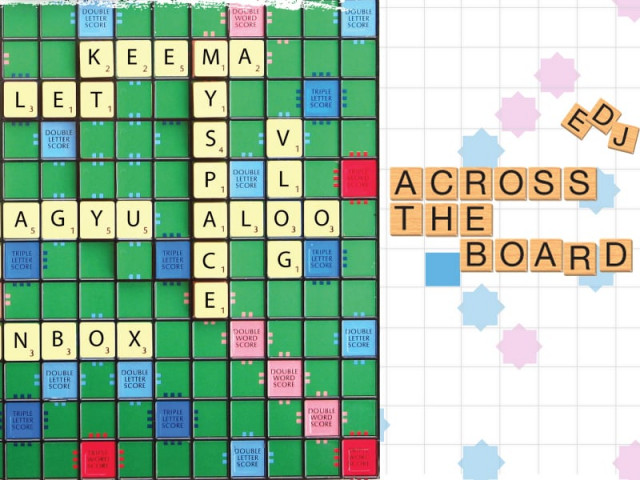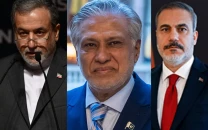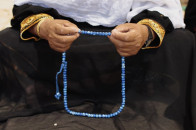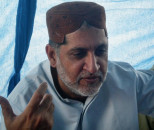Scrabble: Across the board
Empowerment is the magic word for young Pakistani scrabble players.

Empowerment is the magic word for young Pakistani scrabble players. DESIGN: TALHA AHMED KHAN
While mainstream sports like cricket, football and hockey have failed to produce world champions in recent years, scrabble has managed to achieve the feat last year at the 2013 World Youth Scrabble Championship (WYSC). Pakistan’s 16-year-old Moizullah Baig, also known as the wonder boy in the local scrabble circuit, was crowned the champion with an impressive spread of +1448, winning 19 matches out of the gruelling marathon of 27 games. Javeria Arshad Mirza also took second position in Dubai among 136 participants from different countries, including the US, England, Australia, New Zealand, Malaysia, India and Thailand. The team had a clean sweep at the WYSC, with six other Pakistanis concluding the tournament in the top 20.

Scrabble accessories: Tiles, a timer to keep track of the speed and a score sheet to tabulate results. PHOTO: AYESHA MIR
The sudden rise of these players at the international junior scrabble circuit is the fruit of Pakistan Scrabble Association’s (PSA) efforts for the last three years.
“Everyone in the world was shocked and wondered how Pakistani teenagers won the title,” says PSA Vice President Javaid Iqbal. “But in reality we’ve been working with the young players and we had set the goal of winning the WYSC.” With a little motivation and work at the grassroots level, the U18 scrabble players have proven themselves as a force to be reckoned with in the international arena.
Word play
The PSA was established in 1989 by Abu Arif, and then taken over by Goshpi Avari. Scrabble enthusiasts continued to play the game over the weekends at the Beach luxury Hotel but the tables turned with the introduction of the youth programme by Tariq Pervez in 2009, who was also a national player.
“It’s more about my love for the game,” says Pervez. “We have our own family and then this scrabble family here.”
Like any family, there are the older players, the new generation, which includes the WYSC squad, and even younger ones, like 11-year-old Taha who is now seen as a favourite after Baig.
“There’s really no back story except that scrabble is my passion even though I’m a businessman,” says Pervez. “I still make sure that I make time for playing and the youth programme despite my work and family life.” But getting to this point has not been easy. While scrabble was just played among the older enthusiasts during PSA’s earlier days, Pervez wanted to see more competition in local events and enable Pakistani talent to compete at a global level. “Our national players weren’t good enough to compete internationally,” he elaborates. “We needed new and younger players so that we could train them.” Initially the idea was met with resistance by the older lot but gradually things changed and he found support in his fellow players and friends Muhammad Inayat, Maria Soares and S Wajid Iqbal among many others.

A practice session at the Beach Luxury Hotel, Karachi. The session has been taking place every Saturday afternoon for the past five years. PHOTO: AYESHA MIR
The best way to go about this was to involve different schools in scrabble tournaments. This is how the PSA found its new pool of players including five-time national champion Waseem Khatri, Moizullah Baig, CAMS College student Yash Gandhi, Karachi Grammar School’s Arham Abidi and Javeria Mirza, St Michael’s Vali Muhammad Khubaib, Beaconhouse School System’s Javeria Salman and the City School Darakhshan’s Syed Talal Amjad among others, who eventually became part of the WYSC squad. “We value merit and talent. This forum is open to all; anyone can walk in and play scrabble,” says Pervez.
Furthermore, he ensured that the opportunity was not limited to a certain income class or crop of schools. “We started the inter-school championship at every educational institution without any discrimination,” he says. “We made sure that we were not just featuring students from a particular locality or strata. We found talented players representing schools from North Nazimabad, Bhimpura and Katti Pahari in the championship.” Currently, more than 100 schools and over 650 students participate in the inter-school championship.
The club’s resounding success has been its biggest selling point. The first WYSC squad finished at the eighth position in Manila in 2010, climbing to the fifth spot in 2011 and eventually earning the third position in Birmingham in 2012. “That was the point when these kids realised that if they can defeat British players they can win this title too,” says Pervez.
A whole new wor[l]d
For players like Khatri and Baig, scrabble is not just a sport but also a shot at a better life. Khatri who grew up in Kharadar, Karachi, took everyone by surprise when he competed at the inter-school level and went on to become the five-time national champion. “I had seen scrabble as a child when my cousin Ashraf Khatri used to come to PSA to play,” says the 23-year-old. At the time he never imagined he would one day be competing at an international level. But the endless training sessions for improving vocabulary and mastering the rules of the game with his cousin and elder brother eventually paid off. Currently he is pursuing a degree in chartered accountancy along with training new talent at the PSA.

11-year-old Taha is seen as the next favourite after Baig. PHOTO: AYESHA MIR
Baig’s initial stint with scrabble was limited to inter-school events until he defeated Khatri during his debut match at a national championship in February 2012. “It stunned everyone, and the PSA encouraged me to continue playing. Later, I went to Malaysia and Thailand with the Pakistan squad in early 2013 and then WYSC happened,” he says. The WYSC victory has transformed Baig into a hero in his neighbourhood in Nazimabad, Karachi, and has opened gates for a lot of other young talent. Baig attributes the entire credit for his victory to the PSA.
The PSA has not only eliminated income divides and created a level playing field for all its members but has also inculcated a sense of acceptance and tolerance. Sixteen-year-old Yash, who was often teased as the ‘Gandhi in Jinnah’s town’ in his neighbourhood, is a prime example of this change. “When I started coming to PSA events four years ago, I was more of an extremist. I belonged to the religious minority and I was also anti-social,” he says. “But when I saw people [from different backgrounds] especially on our WYSC trip to Brimingham in 2012, I realised that every human being is the same. There is no difference.”
Like Yash, Baig and Mirza also agree that scrabble has helped them immensely with their self-confidence and opened them up towards new people and experiences.
Tile and tactic
While most of us remember scrabble as just a board game that parents use to improve English language skills, it is so much more: it’s a math-brain exercise, one that combines spatial relations, board geometry and language maximisation. And the PSA and its players worked day and night before the 2013 WYSC to perfect every aspect of the game.

Moizullah Beg with his cheque and trophies after winning the World Youth Scrabble Championship. PHOTO GULF SCRABBLE
Along with their weekly tournaments, the players used specialised software and online resources to improve their techniques. Contrary to popular belief, the game requires more than just good vocabulary.
“If English was the main element, then the British should have been the champions. But it’s more about understanding the space on the board, the scoring for each word and it is mathematical in many ways,” explains Baig.
A player follows the dictionary, according to seasoned national player Inayat. “Sometimes we use words that we don’t use in [normal] conversation. It’s very different,” he says. “Scrabble is a game of probability; each player knows how many letters there are in the sack and try to pull them out hoping to get more vowels than consonants.”
However, some alphabets are more problematic than others. For Inayat, it is the letter ‘Q’ that is always a catch while Moiz struggles with the letter ‘V’. He says the word ‘Zyzzyva’ is the hardest one he has come across till date.
Along with training players, the PSA also ensures that it maintains a vibrant online presence so that their achievements can find a broader audience. This is an additional feather in the cap of the club’s technology wizard, Khubaib, who diligently updates the players’ points and rankings according to the international ranking system.
“I’m in touch with a Canadian computer engineer who helps me with improving the software required for scrabble and updating the ranking system, since each player gets a different amount of points,” he explains. If a weaker player defeats a stronger player then he gets more points for the match. “Not only do I get to see every player and know their points but am also getting exposure in a field that I want to pursue.”
With new talent to train, Pervez has also ventured into making new scrabble boards that are similar to the ones that are used in international competitions.
Pervez says the first batch manufactured by him was heavy and not as attractive as the third one being used by the PSA now. “These are customised boards. The ink on the board, the tiles and the material is durable. Each board costs us Rs4,000 and we made around 500 of these,” he says. “But this is a good product and more importantly it is helping the PSA players. We are not manufacturing them commercially.”
Building blocks
After the 2013 WYSC, countries like India, Malaysia, Qatar, and Trinidad and Tobago have also asked Pervez to help them develop similar grassroots programmes. PSA’s success has also made waves with The International Mind Sport Association, which is looking to develop programmes that can generate a similar interest for mind sport in the youth in the UK.“I met Pervez in Prague who told me that 600 to 650 players compete in local tournaments. If we have that kind of turnout in England it will be fantastic,” says Eduardo Sajglik, development manager at Mind Sports International.
The unprecedented success in 2013 also bought a lot of corporate sponsors for the PSA. According to Pervez, sending players to international events was challenging earlier as it required contribution from the families and the PSA itself. But with more corporate sponsors on board, things are expected to become easier. “We don’t really need much to hold our weekly sessions, but now sponsors are coming to us for events and that is a good sign.”
And with luck, talent and perseverance on their side, this underdog of a sport is all set to spell Pakistan in golden words in the years to come.
Natasha Raheel is a Karachi-based sports reporter for
The Express Tribune.
Published in The Express Tribune, Sunday Magazine, March 16th, 2014.



















COMMENTS
Comments are moderated and generally will be posted if they are on-topic and not abusive.
For more information, please see our Comments FAQ